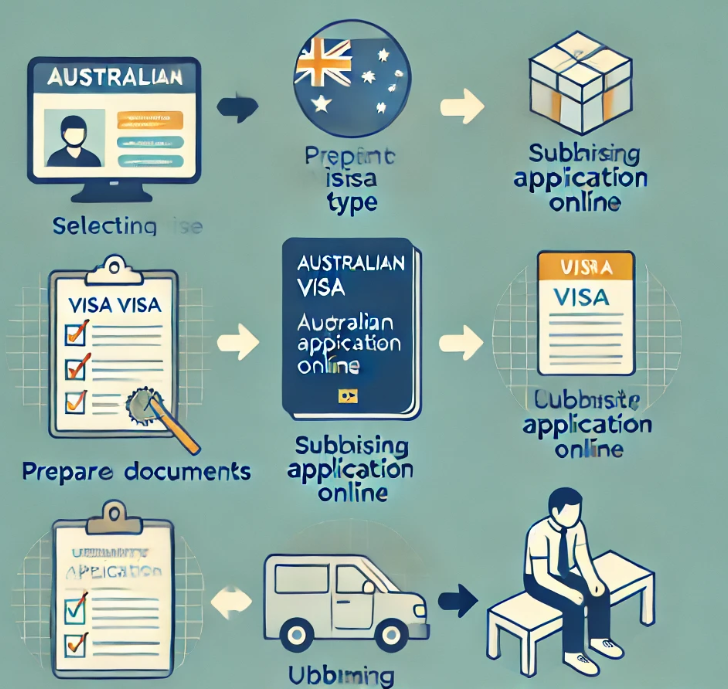- Remittance
- Exchange Rate
- Stock
- Events
- EasyCard
- More
- Download
Want to Immigrate to Australia? Detailed Guide on Visa Requirements, Application Steps, and Remittan
Australia, with its high quality of life, excellent education system, and abundant employment opportunities, has become a dream destination for many aspiring immigrants. However, immigrating to Australia is not easy. You must meet a series of strict conditions and go through a complex visa application process. Before that, mastering how to smoothly transfer funds to Australia is crucial for ensuring a successful immigration process.

Mainstream Remittance Channels
Whether it’s for paying visa fees, tuition, purchasing a house, or daily living expenses, choosing the right remittance method is crucial.
Bank Transfer
Bank transfer is the most common remittance method. You can transfer funds to an Australian bank account through your country’s bank. This method is relatively secure, but the remittance time is longer, usually taking 3 to 5 working days.
International Remittance Companies
International remittance companies like Western Union and MoneyGram provide fast remittance services. These companies usually have numerous outlets worldwide and can complete fund transfers in a short time. However, their fees are relatively high.
Online Remittance Platforms
Online remittance platforms such as Wise and BiyaPay offer convenient remittance services. Compared to traditional banks and international remittance companies, online remittance platforms usually have lower fees and can complete transfers within minutes. For instance, BiyaPay’s handling fees are as low as 0.5%, with no limit on the remittance amount. It supports local transfers in most regions or countries worldwide, achieving same-day transfers. Additionally, it supports the real-time exchange of over 200 digital currencies like Bitcoin and Ethereum with major currencies like AUD and USD.
Conditions for Immigrating to Australia
Skilled Migration Conditions
Skilled Occupation List
Applicants for skilled migration must choose an occupation from the Australian government’s Skilled Occupation List (SOL) that matches their professional background. This list includes various professionals needed in Australia.
Age Requirements
Applicants must be under 45 years old. Those aged between 25 and 32 can earn the highest age points.
Language Proficiency
Applicants need to pass internationally recognized English tests such as IELTS or TOEFL and achieve the required minimum scores.
Work Experience
Generally, applicants need to have at least three to five years of work experience related to the occupation they are applying for.
Point System
Skilled migration uses a points-based system. Points are awarded based on age, English proficiency, work experience, education, and Australian work or study experience. The minimum passing score is usually 65 points.
Family Reunion Migration Conditions
Spouse Visa
Applicants must be the spouse or de facto partner of an Australian citizen, permanent resident, or eligible New Zealand citizen. They must provide proof of their relationship and pass health and character checks.
Parent Visa
Applicants’ children must be Australian citizens, permanent residents, or eligible New Zealand citizens. Parent visas include contributory and non-contributory options. Contributory parent visas are processed faster but are more expensive.
Child Visa
Applicants must be the child of an Australian citizen, permanent resident, or eligible New Zealand citizen. They must provide proof of the parent-child relationship and are usually required to be under 25 years old.
Investment Migration Conditions
Applicants need to invest a certain amount in Australia, usually between 1.5 million and 5 million AUD, and provide proof of legally obtained assets. Additionally, they must have a successful business background and management experience.
Student to Permanent Residency Conditions
Applicants need to complete at least two years of higher education courses in Australia, find a job related to their field of study, and gain the required work experience. They also need to meet the minimum score in an English proficiency test specified by the immigration department.
After meeting these conditions, applicants can submit their applications and enter the visa review process. Understanding these conditions helps applicants better plan their immigration path and increase their chances of success.
Steps for Visa Application
Successfully immigrating to Australia requires not only meeting the relevant immigration conditions but also following strict steps for visa application.
Choose the Visa Type
First, choose the most suitable visa type based on your personal situation. For example, skilled migration is suitable for applicants with professional skills and work experience, while student to permanent residency is suitable for international students who wish to stay in Australia after graduation.
Prepare Application Materials
Application materials mainly include personal identification information (such as passport, birth certificate, marriage certificate, etc.), educational and work proof (such as degree certificates, work references, recommendation letters, etc.), and language proficiency proof (such as IELTS, TOEFL, or PTE Academic English test scores).
Submit the Application
After preparing all materials, submit the visa application online through the Australian immigration department’s official website. The online application system will guide applicants to fill in personal information, upload materials, and ensure all information is accurate. During submission, applicants also need to pay the corresponding visa fees online.
Medical Examination and Background Check
After submitting the visa application, applicants need to undergo a medical examination and background check. The medical examination is conducted by designated medical institutions to ensure applicants meet health requirements. The background check includes character tests and criminal record checks to ensure applicants have no criminal records.
Wait for Approval Results
After completing all steps, applicants need to patiently wait for the visa approval results. Approval times vary depending on the visa type and the applicant’s specific situation, ranging from a few weeks to several months. Applicants can check the application progress and status at any time through the online application system.
Conclusion
In summary, immigrating to Australia is a complex and challenging task, but with thorough preparation and reasonable planning, you can greatly increase your chances of success.

























